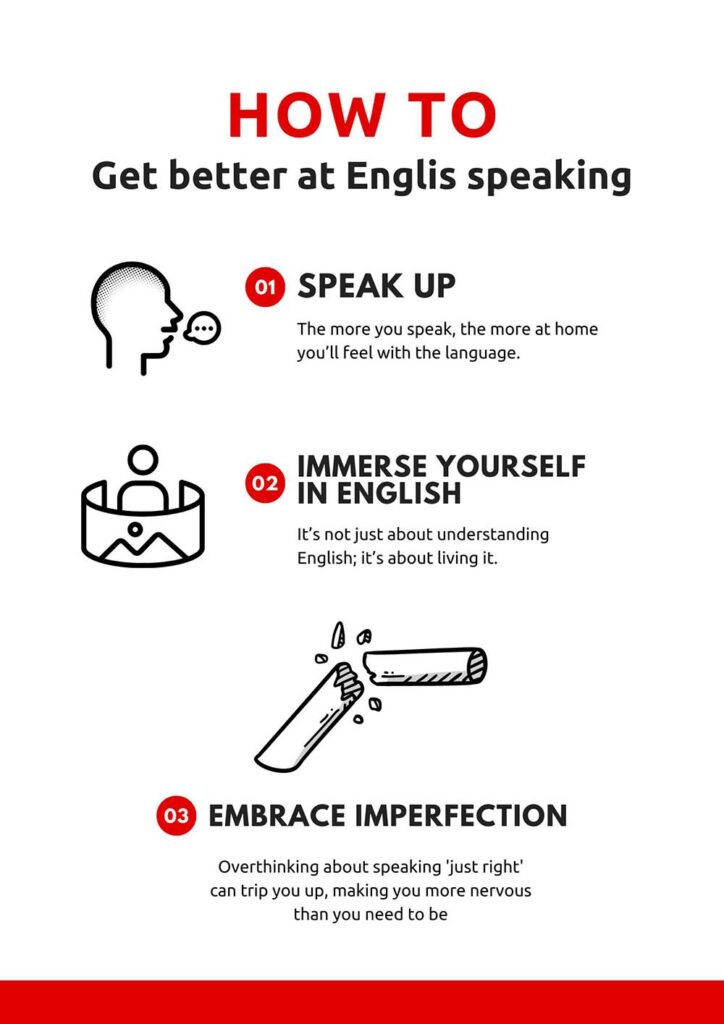
7 practical tips to get better at English speaking
Hi, learners!
Are you ready to jazz up your English speaking skills?
Whether you’re just starting to dip your toes in the language or you’re aiming to polish your conversational flair, we’ve got some top-notch tips that will transform the way you speak English!
From honing your pronunciation to mastering the art of small talk, we’ll uncover the secrets that make speaking English a breeze!
So, buckle up, and let’s embark on this exciting journey together, where every conversation becomes an opportunity to shine brighter in English! Let’s turn those ‘umms’ into ‘ah-ha’s and transform your speaking skills from good to absolutely awesome!
Without further ado, let’s get started!

1. Don’t give a hoot
Alright, here’s your first tip to master English speaking: just let it flow!
Embrace your unique voice and don’t sweat the small stuff. Speaking English isn’t about perfection; it’s about communication and expression!
Throw caution to the wind and speak up, regardless of those little grammar hiccups or the accent you bring to the table. Your accent, it’s a storyteller, narrating tales of where you’ve been, the cultures you’ve embraced, the journey you’re on. There’s no need to hide it or feel embarrassed. In fact, it’s something to celebrate! Each inflection and tone is a unique signature, a personal touch to the universal language of English!
So go ahead, talk, chat, babble, converse – in English, of course! The more you speak, the more at home you’ll feel with the language. Let your words flow and watch your confidence in English soar!
2. Immerse yourself in English
Ready for tip number two?
Surround yourself with English in every way you can!
Tune into English music, let those lyrics flow through you, feel the rhythm, and sing along. Next, movie night? Make it English! Watch films or shows in English, and yes, let’s challenge ourselves: ditch those subtitles!
And here’s the fun part – play the mimic game! Hear a cool phrase or a catchy slang in a song or a movie? Try it out in your next conversation. It’s not just about understanding English; it’s about living it. This immersion is your ticket to absorbing the slang, phrases, and the natural, effortless flow of the language!
Remember, every song, every show, every English conversation you eavesdrop on is a step closer to mastering the language. So, keep your ears open and let English fill your day!
3. Focus on vocabulary
Let’s get real about language – it’s our tool for sharing thoughts, ideas, and everything in between.
When it comes to mastering English, think of vocabulary as your secret weapon. It’s all about having the right words at your fingertips to express your thoughts, feelings, and ideas. Picture vocabulary as the colors on your palette – the more you have, the richer and more vibrant your conversations become!
Imagine you’re building a house. Your vocabulary is like the bricks – the essential pieces you need to shape your structure. Grammar? That’s the mortar that holds your bricks together. Sure, a solid grasp of grammar keeps things neat and orderly, but without those bricks – your words – there’s no house to speak of. This shows just how vital vocabulary is. It’s your foundation, your starting point for every conversation!
And here’s the kicker – knowing a bunch of words can really pump up your confidence. When your word bank is full, diving into conversations feels less daunting. You can strut into a chat, armed with your vocab, ready to mingle, even if your sentences aren’t textbook perfect. This confidence is like a magic potion for language learning. It pushes you to use the language more, experiment with it, and ultimately, get better at it!
So, focus on building your vocabulary. It’s your passport to more engaging, expressive conversations!
4. Know your audience
Here’s a golden rule: always match your English to who you’re talking to!
It’s about understanding your listener’s language level, background, and the conversation’s context. Think of it as choosing the right outfit for the right occasion – it just fits better!
First up, consider how complex or simple your language should be. Chatting with a newbie to English? Keep it simple and straightforward. Talking to a fluent speaker? Feel free to play with more complex sentences and idioms. It’s all about striking the right balance.
Next, cultural context is huge. Different cultures have unique communication styles – some are all about being direct, while others lean towards subtlety. Knowing this can save you from misunderstandings and shows you respect their way of communicating.
Also, the setting of your chat matters. The language you’d use in a professional meeting is worlds apart from a casual talk over coffee. Recognizing the formality of your setting guides you to the right tone and choice of words. For example, if you’re speaking with someone in a hurry, like a bus driver for instance, your focus should be on conveying your message quickly and clearly, rather than trying to construct a perfect sentence. In this context, it’s more about getting the idea across efficiently.
And finally, consider your conversation’s purpose. Is it to inform, persuade, or just to connect? Your objective should steer your language selection.
To sum up, knowing your audience is all about practicality and effectiveness in communication. This approach helps you to communicate more confidently and effectively, without the pressure to speak flawlessly, no matter your level of English proficiency!
5. Don’t worry about perfection
Striving for perfection in language learning, especially in speaking, is not only unrealistic but also counterproductive. no one, including native speakers, speaks a language perfectly!
I mean, think about yourself. How you speak in your native language. You still make the occasional tongue slips, right?’
Languages are living, breathing things, not rigid sets of rules. So, if native speakers can slip up now and then, why put pressure on yourself to be flawless?
Think of speaking English as sharing a story, not delivering a speech. The real goal? To be understood, to connect. If you get your message across, that’s a win, even if it comes with a few hiccups.
Every time you stumble over a word or get tangled in tenses, guess what? You’re learning. It’s these moments that sharpen your skills and expand your understanding. They’re not setbacks; they’re stepping stones!
Overthinking about speaking ‘just right’ can trip you up, making you more nervous than you need to be. Flip the script and see speaking as an adventure, not a test. The more you relax, the more your natural confidence shines through. And confidence, my friends, is your best ally in language learning!
6. Tune in to learn
Yes, you heard that right – your ears are just as important as your tongue in this journey!
Remember, language is primarily a spoken form of communication. Writing is just a representation of what we say. So, the path to speaking English well often starts with listening to it in its natural habitat – the real world, not just the pages of a textbook.
When you listen to native English speakers – be it in a podcast, a TV show, or a casual conversation – you’re immersing yourself in the language as it’s actually spoken. This is where you pick up the real gems – the idioms, the slang, the colloquial expressions, and the musicality of the language. These elements bring English to life and give it flavor.
But listening is more than just a passive activity. It’s an active skill that involves understanding and processing language on the fly. Think of it as a workout for your brain, preparing you for the quick thinking required in real-time conversations.
The beauty of today’s world is that you have an all-access pass to English in all its glory, thanks to the internet. YouTube, podcasts, films, and TV series are treasure troves of authentic spoken English. They’re your playground for tuning your ear to the language, learning how it flows, how it feels, and how it’s used in everyday life.
So, grab those headphones and start listening!
7. Learn in chunks
What’s a chunk, you ask? It’s like a ready-made phrase or a group of words that often hang out together in the English language.
Think of chunks as the language’s building blocks. They come in different forms – collocations (those words that love each other’s company, like ‘heavy rain’), idioms (our quirky expressions like ‘walking on air’), and even those handy fillers or transition phrases (like ‘on top of that’). These chunks are like the secret sauce for sounding more like a native speaker!
Now, here’s how to make them work for you: Whenever you learn a new word, don’t just memorize it in isolation. Get to know its buddies too. Learn phrases and expressions that feature your new word. For instance, if ‘shopping’ is your new word, acquaint yourself with phrases like ‘weekly shopping’ or ‘shopping spree.’ Another example would be “education”, you can learn associated concepts like “primary education” and “higher education”, and so on.
This approach increases fluency as it reduces the time needed to think about each word individually. It’s faster and ensures more accurate language use, akin to putting together large pieces in a puzzle instead of tiny individual pieces.
So, start collecting these language chunks. They’ll not only help you speak more smoothly but also give you a deeper insight into the nuances of English!
Summary
And there you have it! Seven tips to help you get better at English speaking!
Remember, the journey to fluency is a mix of courage, practice, and smart strategies. Embrace your unique voice, immerse yourself in the language, and always keep the communication doors open.
Most importantly, enjoy the process and the incredible growth that comes with it!
Whether you’re chatting with a friend, presenting in a meeting, or just practicing in front of a mirror, every word you speak is a step closer to mastery. So go ahead, make those mistakes, try out those new phrases, and let your confidence soar. You’ve got this!
Happy learning and keep on speaking!
At IELC, we teach English the right way
Our goal is to get you speaking in English with fluency and confidence as fast as possible. We want to give you the skills you need to fulfil your potential!
Our experienced teachers will guide you along every step of the learning process to ensure that you are not wasting your time, money, and energy on useless language exercises & wrong methods.
Our courses
With our modern campus and technology, we are equipped to provide the best possible courses for children, teens, and adults, including:
Online and on campus IELTS courses
Online and on campus TOEFL PBT courses
Online and on campus TOEFL iBT courses
We offer our classes in group classes or private classes.
No matter what your goals are, our team will help you achieve these goals by providing you with Indonesia’s best English courses!
Talk to our team today to get your FREE consultation and take your first step towards success.
Sincerely,

IELC Academic Director
